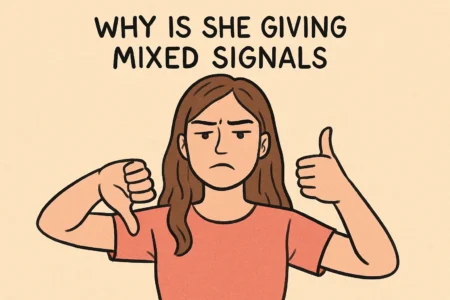The resentment started on a Tuesday. I can still feel the weight of my bag digging into my shoulder as I stood in the doorway, my coat still on, listening to my partner, Mark, unload the day’s frustrations. It was a familiar routine. I’d absorb his stress, nod, murmur all the right things, and by the time he was done, I was an empty shell. My own needs? Gone. My energy? Depleted. I loved him, but I was slowly erasing myself from our relationship. That night, a tiny, bitter seed was planted, and it was the start of my journey to figure out one of the most misunderstood parts of a partnership: healthy boundaries.
For years, I thought “boundary” was a dirty word. I pictured a cold, brick wall. A line in the sand. Basically, a sign that your relationship was failing. I couldn’t have been more wrong. I’ve learned that healthy boundaries aren’t about shutting people out. They’re about creating the space to let them in without losing yourself in the process. It’s about building a framework of respect where both of you can actually thrive. This isn’t some abstract concept; it’s a real, learnable skill that completely changed my life.
More in Relationship Health Category
Key Takeaways
- They’re for you, not to control them. Think of boundaries as guidelines to protect your own well-being, not rules to manipulate your partner.
- Guilt is part of the process. You’ll probably feel guilty at first. That’s normal for people-pleasers. Acknowledge it, breathe through it, and hold the line anyway.
- How you say it matters. A boundary delivered with kindness is easier to hear than one shouted in anger. Clear, calm, non-blaming language is your best friend.
- Start small. Be consistent. You don’t need to fix everything at once. Pick one small thing, practice it, and stick with it. Consistency is what makes boundaries real.
- Your gut knows. That nagging feeling of resentment or burnout? It’s not an overreaction. It’s a flashing neon sign that a boundary is needed.
But What Exactly Are Healthy Boundaries, Anyway?
Let’s get this straight, because so many people get it wrong. A healthy boundary is simply where you end and another person begins. It’s not a fortress wall; it’s more like a garden fence. That fence isn’t there to keep the world out in anger. It’s there to protect what’s growing inside—your peace, your energy, your very sense of self. It has a gate. You get to decide when to open it and what you let in.
Without that fence, things get messy. You become enmeshed. You can lose your identity, put their needs so far ahead of your own that you forget you even have them, and start building up that slow-burning resentment I know so well. Setting a boundary is the ultimate act of self-respect. It’s the foundation of a partnership built on mutual respect.
Aren’t Boundaries Just a Way to Push People Away?
This is the biggest myth out there, and it’s the one that kept me trapped for years. I was terrified that saying “no”—or just asking for a little space—would make Mark think I didn’t love him. But here’s the truth I had to learn the hard way: a lack of boundaries is what really pushes people away. When you don’t have them, you give until you have nothing left. You say yes until you’re seething with frustration. Eventually, you either explode or retreat because you’re just done.
Healthy boundaries do the exact opposite. They stop the burnout before it starts. When you clearly state what you need, you’re handing your partner a roadmap to loving you better. You’re saying, “This is what I need to feel safe and whole in this relationship.” When you can both do that, it creates a powerful sense of trust. It actually pulls you closer.
So, Are There Different Types of Boundaries?
You bet. And knowing the different kinds can help you figure out exactly where the fence needs mending.
- Emotional Boundaries: This is about your feelings. It’s knowing you aren’t responsible for your partner’s happiness. It’s refusing to take the blame for their bad day. It’s also about protecting your own energy and saying, “I don’t have the capacity to be your sounding board right now.”
- Physical Boundaries: This is your personal space, your body. It covers everything from how much affection you want to needing five minutes alone in the bathroom without an audience.
- Time Boundaries: Your time is gold. This is about protecting it. It means carving out “me time,” not saying yes to every social invitation, and having the right to finish what you’re doing before you have a conversation.
- Digital Boundaries: A huge one these days. What are the rules around phones and passwords? How much of your life gets posted online? Is there an expectation to text back immediately? These are all digital boundaries.
- Material Boundaries: This is about your stuff and your money. Can they borrow your car? How do you handle joint finances? Setting clear expectations here can prevent a world of conflict.
Why Do I Feel So Guilty Every Time I Try to Set a Boundary?
That wave of guilt. It’s paralyzing, isn’t it? The second you think about saying “no,” your stomach drops and your mind races. Am I being selfish? What if they get mad? I’ve been there. For a long time, guilt was the biggest thing holding me back.
It often comes from how we were raised. Many of us, and women in particular, are taught to be the nice ones, the helpers. Our value, we’re told, comes from our ability to keep the peace and care for others. Saying “no” feels like a betrayal of that identity. It feels dangerous.
I think back to my early days with Mark. He had this habit of calling me at work to unload about his own job stress. At first, I was the “good girlfriend,” always ready to listen. But soon, I started to dread my phone ringing. I’d be deep in a project, and that 20-minute vent session would completely shatter my focus. The thought of telling him to stop, though? It brought on a tidal wave of guilt. I was more concerned with playing a role than I was with my own sanity. Guilt was my cage.
How Can I Figure Out Where My Own Boundaries Need to Be?
You can’t build a fence if you don’t know where your property line is. The work starts by looking inward. You have to become a student of your own feelings. I spent years ignoring my own internal warning system—the flicker of irritation, the bone-deep fatigue. I learned that my emotions were like a built-in compass, always pointing toward a place where a boundary was needed.
All you have to do is learn to listen. Your body and your heart will tell you what you need to know.
What Are the Telltale Signs That a Boundary Is Needed?
Your feelings are the most honest friend you have. If you notice a pattern in how you feel around your partner, that’s your clue. These are the big three:
- Resentment: This is the flashing red light. It’s the feeling of being perpetually taken for granted. It’s the poison that grows when you consistently say yes when you desperately want to say no.
- Irritability: Find yourself snapping over little things? That frustration might be a symptom of a much bigger limit being crossed. It’s your brain’s way of shouting, “Enough!”
- Exhaustion: If your relationship consistently leaves you feeling drained, something is wrong. A healthy partnership should fill you up more than it empties you out. Feeling tired all the time can mean you’re giving away far too much of yourself.
Can You Give Me Some Questions to Ask Myself?
Take some time for yourself. Seriously. Put the phone down, grab a notebook, and get brutally honest. Writing it down makes it real.
- When do I feel the most stressed or uncomfortable with my partner?
- What conversations or situations leave me feeling totally drained?
- What do I find myself constantly complaining about (to my friends or just in my head)?
- When was the last time I said “yes” when I meant “no”? What was it?
- What do I secretly wish they would just stop doing or start doing?
- What do I desperately need more of in my life? (e.g., quiet, fun, sleep) Is my relationship getting in the way?
- If I had a magic wand, what’s the one thing I would change about how we interact?
I Know What I Need, But How Do I Actually Say It Without Starting a Fight?
Okay, deep breath. This is the scary part. You have to translate that internal need into external words. Your delivery, however, can make all the difference. The goal is to be clear, kind, and firm. You’re not attacking them; you are taking care of yourself.
Remember this: you are responsible for delivering the message respectfully. You are not responsible for their reaction.
Is There a Formula for Communicating a Boundary?
Thank goodness, yes. And this little formula saved me from so many potential arguments. It’s the “I feel” statement. It frames everything from your perspective, and no one can argue with how you feel.
Here it is:
“I feel [your emotion] when [the specific behavior happens]. What I need is [your clear request].”
Let’s use it.
- “I feel…”: Start with you. (“I feel anxious,” “I feel overwhelmed.”)
- “…when…”: Describe the action, not the person. Don’t say “when you’re being annoying.” Say “when I’m interrupted while I’m on a work call.”
- “What I need is…”: This is the boundary. Be specific. (“What I need is for you to wait until my call is over.”)
What’s the Best Time and Place to Have This Conversation?
Timing is everything. Do not try to lay down a new boundary in the heat of an argument. It will never work. Instead, choose a moment when you’re both calm and can actually listen to each other.
Find a neutral time and place. Turn off the distractions. Say something simple like, “Hey, is now a good time to talk? There’s something on my mind.” That simple question shows respect and sets the stage for a real conversation.
That’s what I finally did with Mark. On a quiet Saturday, I took a breath and said, “I feel really stressed and scattered when I get calls about work stuff during my workday. I love you and I want to hear about your day, but I need my work time to be focused. Can we plan to catch up on all of it when we’re both home?” He was quiet for a second. He genuinely hadn’t realized the impact. Because I didn’t attack him, he could actually hear me. That one conversation was a turning point.
What If My Partner Reacts Badly?
This is the big fear, isn’t it? And it’s a real possibility. When you change the unspoken rules of a relationship, you can expect some turbulence. If your partner has benefited from your lack of boundaries, they might not be thrilled when you start building them. Be prepared, stay calm, and hold firm.
Their reaction is about them, not about you. Your only job is to stay true to what you need.
What Kinds of Reactions Should I Prepare For?
Pushback is normal. Don’t let it throw you. You might see:
- Defensiveness: “What’s the big deal? I can’t even talk to you now?”
- Guilt-Tripping: “Fine, I guess I’ll just deal with everything by myself from now on.”
- Testing: They might agree, then do the exact same thing a few days later just to see if you were serious.
- Genuine Confusion: Sometimes, they truly don’t understand and might be hurt. This is an opportunity to explain your side with kindness.
How Do I Stand My Ground Without Escalating the Situation?
Stay calm. This isn’t a fight to be won. You are simply upholding a limit. Acknowledge their feelings without caving. “I hear that you’re upset,” is a powerful phrase.
Then, just calmly restate your boundary. You don’t need to justify it or apologize for it. It’s like a broken record. “I understand you’re frustrated, and I need to keep my work hours focused on work.” If they keep pushing, you are allowed to walk away. “We’re going in circles. Let’s take a break from this conversation for now.” For more on this, the University of California, Berkeley’s Greater Good Science Center has fantastic resources on how to communicate effectively without arguing.
Can You Walk Me Through Some Real-World Examples?
Theory is one thing; real life is another. Here are a few common scenarios.
What If They’re Always Checking My Phone?
This is about a fundamental lack of trust and a huge violation of privacy.
- The Scenario: You see your partner scrolling through your private messages.
- The Boundary Conversation: “I feel hurt and distrusted when I see you looking through my phone. My phone is my private space. I need you to stop. If you’re feeling insecure, please talk to me about it so we can figure it out together.”
How Do I Handle a Partner Who Vents Constantly Without Asking?
You are their partner, not their emotional dumping ground.
- The Scenario: They launch into a tirade the second you walk in the door, every single day.
- The Boundary Conversation: “I feel overwhelmed when I have to absorb a lot of venting the moment I get home. I want to support you, but I need a few minutes to breathe first. From now on, can you ask if I have the energy to listen before you start?”
What About When Our Families Get Too Involved?
This requires a united front. My friend Sarah lived this. Her mother-in-law, while sweet, would drop by unannounced constantly. Sarah felt like she had no privacy, but her husband saw it as normal. Finally, Sarah explained that she needed her home to be a sanctuary. They agreed to tackle it as a team. The next time it happened, her husband said, “Mom, we love having you, but we need you to call before you come over from now on.” It was awkward, and feelings were a little hurt at first. But they held the boundary with love. Their relationship with her is now stronger than ever because the time they spend together is intentional.
Does Setting Boundaries Ever Get Easier?
Yes. A thousand times, yes. The first time feels impossible. But each time you do it, that muscle gets a little stronger. You start to see the results—less resentment, more peace—and it becomes your new way of being. It’s an ongoing practice, not a one-time fix. But eventually, it stops feeling like a confrontation and starts feeling like simple, honest communication.
How Do I Keep My Boundaries Strong Over Time?
Consistency is everything. Each time you let a boundary slide, you’re teaching the other person that it’s optional. You have to be willing to gently and kindly reinforce it. It’s not about being mean; it’s about being clear. And remember, boundaries can change. What you needed a year ago might be different today. Check in with each other. “Hey, how is our new system of _______ working for you?”
What Are the Long-Term Rewards I Can Look Forward To?
Getting through the initial discomfort is so worth it. This isn’t just about reducing conflict; it’s about transforming your relationship from the inside out. You can look forward to:
- Real Intimacy and Trust: When you both feel safe enough to be honest about your needs, that’s where real connection happens.
- Sky-High Self-Respect: Honoring yourself sends a powerful message to your own soul: “I am worthy of being cared for.”
- So Much More Energy: When you plug the dam of over-giving and resentment, you’ll be amazed at how much energy you have for the good stuff.
- An Authentic Partnership: You get to be in a relationship with the real them, and they get to be with the real you. No masks, no games.
Learning to set healthy boundaries wasn’t a magic bullet. It was a messy process of awkward conversations, small wins, and a few steps back. But with every attempt, I could feel my resentment dissolving. In its place grew a deep respect—for my partner, and finally, for myself. Your relationship deserves that. You deserve that.
FAQ – Healthy Boundaries

Why are boundaries important for your well-being?
Boundaries are essential because they prevent burnout, reduce resentment, and foster mutual respect, enabling both partners to thrive and maintain individual identities within the relationship.
How can I communicate my boundaries effectively without causing conflict?
Use clear, kind, and non-blaming language with a simple formula: ‘I feel [emotion] when [behavior], and I need [specific request],’ choosing a calm moment for the conversation to promote understanding.
What should I do if my partner reacts negatively to my boundaries?
Stay calm and firm, acknowledge their feelings without caving, restate your boundary clearly, and if necessary, take a break from the conversation, knowing their reaction is about them, not you.
How can I keep my boundaries strong over time?
Maintain consistency by reinforcing your boundaries gently and regularly, and recognize that boundaries can evolve; checking in with your partner ensures they remain relevant and respectful.





